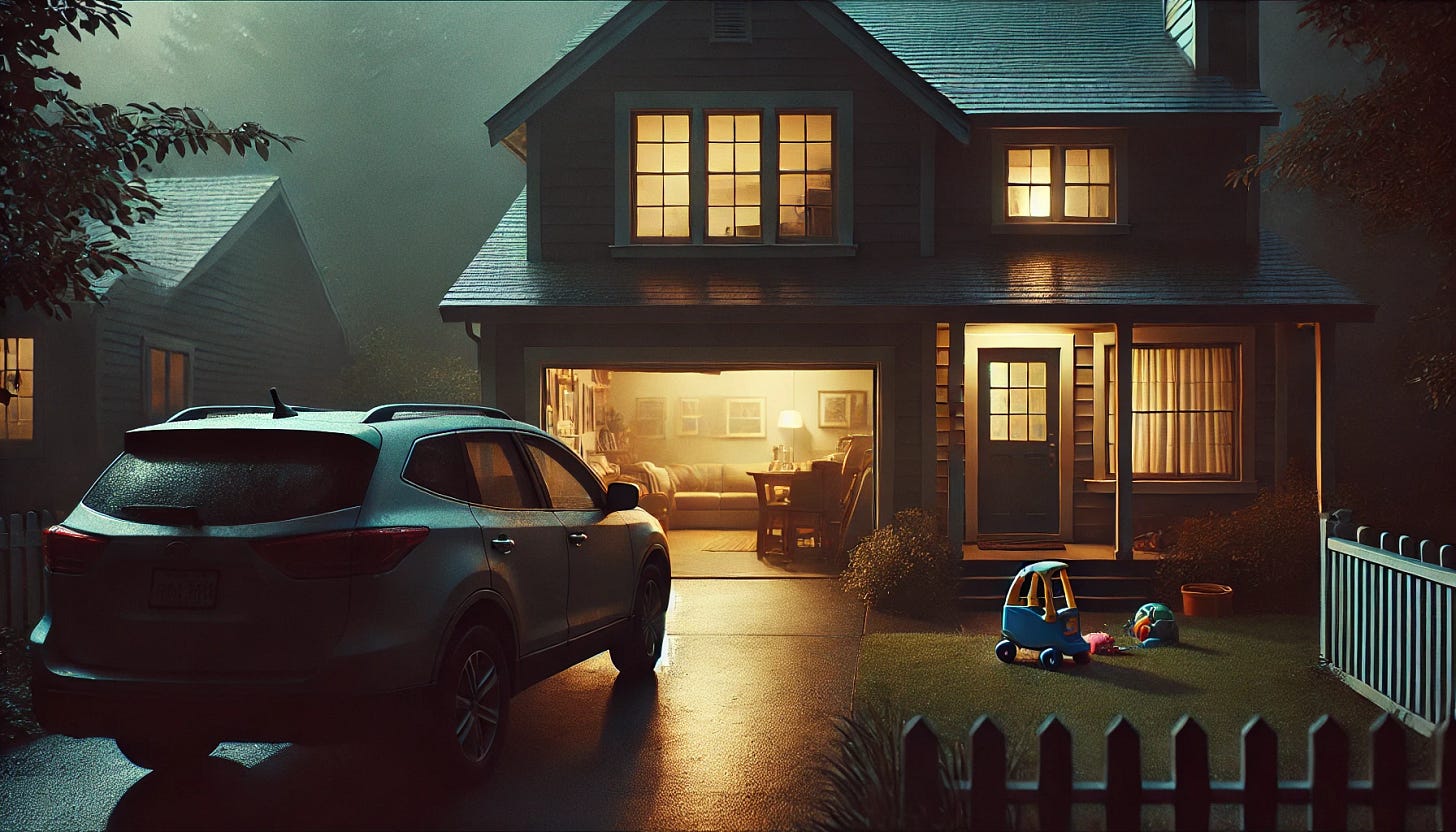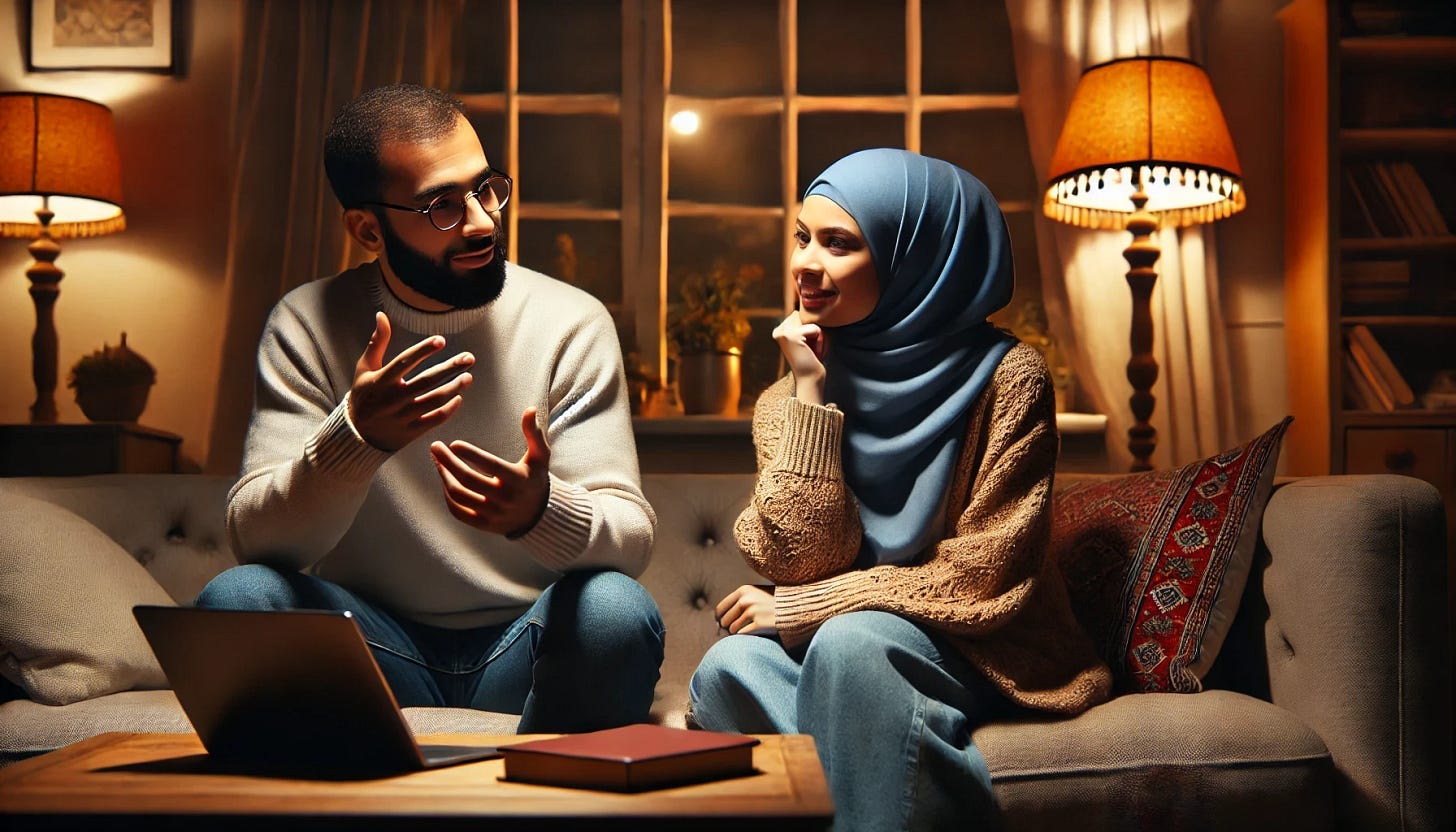Tale#4: Hasan's Eye Opening Talk on Islamic Parenting
Parenting Gems Every Muslim Home Needs
The night air was cool, carrying the scent of freshly cut grass as Hasan pulled into the driveway. He killed the engine and sat there for a moment, staring at the dimly lit porch of their home. Inside, he could see the warm glow of the living room lamp through the window, the shadows of toys scattered across the floor.
He exhaled, his mind still swirling with thoughts from the lecture at the masjid. The sheikh’s words had struck something deep within him, and he felt a sense of urgency—like a realization had finally hit him square in the chest.
Pocketing his keys, he stepped out of the car and walked toward the front door. The soft hum of crickets in the background made the silence feel heavier, like a pause before an important moment.
Inside, Aymen was sprawled on the couch, wrapped in a light throw blanket, scrolling absentmindedly on her phone. Her laptop sat open beside her, but the soft rhythm of the kids' breathing from their rooms told him she had probably been waiting for him to come home before shutting it for the night.
She looked up as he walked in, immediately catching something in his expression.
"You okay?" she asked, setting her phone down and tucking her legs under her.
Hasan rubbed the back of his neck, hesitating for a second before finally sighing. "Yeah. Just been thinking. The sheikh gave a talk at the masjid tonight about parenting… and man, it really hit me hard."
Aymen straightened a little, intrigued. "Oh? What was it about?"
Hasan plopped onto the couch beside her, the weight of his thoughts settling in. "He talked about the three phases of Islamic parenting, based on this hadith:
Play with them for the first seven years, discipline them for the next seven, and be their friend for the next seven. Then, let go."
He glanced at her, waiting for a reaction, but she only frowned slightly, processing the words.
"I mean, I’ve heard it before," he continued, "but tonight, something about it felt… I don’t know, heavier. Like I suddenly realized how much we could be messing this up."
Aymen's frown deepened, but there was no panic in her face—just quiet curiosity. "Alright, tell me more. What exactly did the sheikh say?"
Phase 1: The Playful Years (0-7 years old) – Building a Foundation of Love
Hasan leaned back, resting his head against the couch. "The sheikh said that the first seven years are all about love and connection. That’s the time when kids learn through play, through affection, through feeling safe. It’s not about strict rules yet. It’s about making sure they love being around us, so when the time comes to teach them discipline, they actually care about what we say."
Aymen smiled a little. "That actually makes a lot of sense. I mean, look at Zayn and Sara. If I turn cleaning up into a race or a game, they’ll do it with so much energy. But the second I say, ‘Pick up your toys now,’ they suddenly become the most exhausted children on the planet."
Hasan chuckled. "Yeah, exactly. And that’s natural. But the sheikh said a lot of parents mess this part up. They expect their toddlers to act like little adults. They want them to sit still in salah, eat without making a mess, follow orders like mini-soldiers. But that’s not how kids work."
Aymen sighed, stretching her legs out. "I’ve seen that too. Some parents expect way too much from kids. And when they don’t listen, they get labeled as ‘naughty’ or ‘disobedient.’ But really… they’re just being kids."
"Exactly. The sheikh said at this stage, the most important thing is attachment. If they don’t feel safe and loved with us now, if they don’t see us as their happy place, why would they listen to us later?"
Aymen nodded thoughtfully. "So, basically, our job right now is to make sure they love us and trust us. The discipline part comes later."
Hasan exhaled. "Yeah… and honestly, that’s a relief to hear. Because man, sometimes I feel guilty when I let things slide. But maybe right now, it’s not about being strict. It’s about making sure they want to be around us."
Phase 2: The Discipline Years (7-14 years old) – Teaching Responsibility
Hasan’s voice grew more serious. "Then comes the next seven years—from ages seven to fourteen. And this is where things get real."
Aymen smirked. "Ah, the ‘I said no, and that’s final’ years?"
Hasan chuckled. "Something like that. But here’s the thing—the sheikh said this phase isn’t about controlling them. It’s about teaching them self-discipline, responsibility, and consistency. We can’t just bark orders. We have to show them the logic behind our rules. If we don’t, they’ll start resisting."
Aymen tapped her chin. "You know… I’ve always wondered about that balance. Like, if we’re too strict, they rebel. But if we’re too soft, they become spoiled. How do we find the middle ground?"
Hasan nodded. "The sheikh said this is the stage where they need structure, but also respect. We should expect them to pray, but also explain why. We should make them do chores, but also teach them responsibility, not just obedience."
Aymen’s expression turned thoughtful. "So, basically, if we don’t set expectations now, they won’t magically wake up at fourteen and become responsible adults?"
"Exactly," Hasan said. "And he said something that really stuck with me—‘If we don’t discipline them now, society will discipline them later.’"
Aymen shivered. "Wow. That’s… powerful."
Phase 3: The Friendship Years (14-21 years old) – Being a Mentor, Not a Boss
Hasan ran a hand through his hair. "Then comes the scary part—the teenage years. Fourteen to twenty-one."
Aymen groaned dramatically. "Teenagers. Are we ready for this?"
Hasan smirked. "We better be. Because here’s the thing—the sheikh said this is when we transition from being authority figures to being their mentors. If we’ve done the first two stages right, this phase should be smooth. If we haven’t… well, this is when a lot of parents lose their kids."
Aymen leaned forward, arms resting on her knees. "So, at this stage, they don’t need control. They need guidance?"
"Exactly," Hasan said. "The sheikh said if we’re still yelling, ordering them around, and treating them like little kids, they’ll emotionally check out. And then they’ll start looking for validation elsewhere—friends, social media, maybe even strangers."
Aymen’s expression darkened. "That’s terrifying."
"Yeah. But if we’ve built a good relationship, they’ll still listen to us—not because they have to, but because they want to."
The Final Phase: Letting Go
Aymen sat back, exhaling. "So…after twenty-one, we just let go?"
Hasan nodded. "Yeah. We’ve done our part. At that point, they make their own choices. And we just pray we did enough."
For a moment, they sat in silence, absorbing the weight of it all.
Aymen leaned back against the couch, crossing her arms with a playful smirk. “So, let me get this straight. We need to be fun enough that they actually want to talk to us, wise enough to guide them without lecturing, patient enough to handle their tantrums and outbursts, firm enough to set boundaries, soft enough to be their safe space, strict enough to keep them on the right path, loving enough that they never doubt we’re on their side, their best friend when they need comfort, and their role model in every way— all while making sure they grow into responsible, confident, and faithful adults?” She raised an eyebrow at Hasan, waiting for his reaction.
Hasan let out a long, dramatic groan and ran a hand through his hair. “Yep. Pretty much. We have the hardest job in the world.” His voice was laced with both exhaustion and admiration for the immense responsibility they had as parents.
Aymen let out a soft chuckle, shaking her head. “Well then, I guess we better get to work.” She nudged his arm lightly, the weight of their discussion settling between them—not as a burden, but as a shared mission.
The night deepened around them, the room dimly lit with the glow of the lamp beside them. They sat in comfortable silence for a while, each lost in thought, understanding that the journey ahead would be anything but easy. There would be challenges, mistakes, and moments of doubt. But now, with a clearer sense of purpose and a commitment to walk this path together, they felt a renewed strength. No matter how hard the road ahead, at least they have the clear path.










